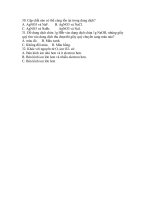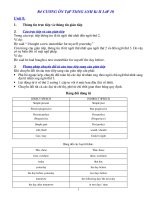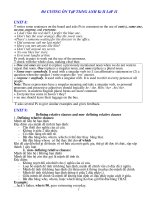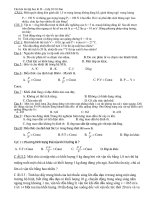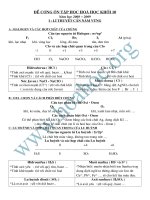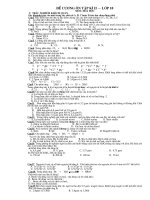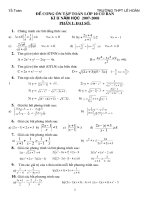DE CUONG ON TAP KI II LOP 10
Bạn đang xem bản rút gọn của tài liệu. Xem và tải ngay bản đầy đủ của tài liệu tại đây (1.13 MB, 43 trang )
1. Cách sử dụng giới từ.
Việc sử dụng giới từ là rất khó vì hầu hết các khái niệm về giới từ đều có những ngoại lệ. Cách tốt nhất để học chúng là
minh hoạ bằng hình ảnh xem chúng thực hiện chức năng nh thế nào so với các giới từ khác và để học những ứng dụng
chung nhất định và những thành ngữ sử dụng các giới từ khác nhau.
Sơ đồ dới đây sẽ đem lại cho bạn 1 ý niệm chung về cách sử dụng giới từ. Tuy nhiên, nó không giúp đợc bạn hiểu những
thành ngữ chứa giới từ nhất định. Đối với những thành ngữ mà tự nó không nói lên nghĩa của nó thì nghĩa của nó sẽ phải
học thuộc. Nghiên cứu các câu ví dụ để hiểu nghĩa của mỗi thành ngữ. Các giới từ và thành ngữ này rất quan trọng trong
tất cả các phần của TOEFL.
Above, over
on
to from
through
into out of
by
Below, under
1.1 During - trong suốt (hành động xảy ra trong một quãng thời gian)
during for + time (chỉ trạng thái).
Ví dụ:
During our vacation, we visited many relatives across the country.
During the summer, we do not have to study.
1.2 From (từ) >< to (đến).
Dùng cho thời gian và địa điểm.
From a time to a time
a place a place
He lived in Germany from 1972 to 1978.
We drove from Atlanta to New York in one day.
From time to time : thỉnh thoảng, đôi khi.
Ví dụ:
We visit the art museum from time to time.
1.3 Out of (ra khỏi) >< into (di vào)
be (run) out of + danh từ : hết, không còn.
be out of town : đi vắng.
Mr. Adams cannot see you this week because he is out of town.
be out of date (cũ, lỗi thời) >< be up to date (mới, cập nhật, hợp thời)
Dont use that dictionary. It is out of date. Find one that is up to date.
be out of work : thất nghiệp.
I have been very unhappy since I have been out of work.
be out of the question : không thể đợc.
Your request for an extension of credit is out of the question.
be out of order: hỏng.
We had to use our neighbours telephone because ours was out of order.
1.4 by
Động từ chỉ chuyển động + by = đi ngang qua.
Động từ tĩnh + by = ở gần, ở bên.
by + thời gian cụ thể : trớc lúc.
Ví dụ: We usually eat supper by six oclock in the evening.
By đợc dùng trong câu bị động để chỉ ra chủ thể gây hành động.
Ví dụ: Romeo and Juliet was writen by William Shakespeare.
By + phơng tiện giao thông (bus/ plane/ train/ car/ ship/ bike).
Ví dụ: We traveled to Boston by train.
By then : trớc lúc đó.
Ví dụ: I will graduate from the university in 1997. By then, I hope to have found a job.
By way of = via : theo đờng.
Ví dụ: We are driving to Atlanta by way of Baton Rouge.
By the way : 1- tình cờ.
Ví dụ: By the way, Ive got two tickets for Saturdays game. Would you like to go with me?
2- nhân đây, tiện đây.
By far + tính từ so sánh : (dùng để nhấn mạnh).
Ví dụ: This book is by far the best on the subject.
By accident / by mistake : tình cờ. >< on purpose (cố tình).
Ví dụ: Nobody will receive a check on Friday because the wrong cards were put into the computer by accident.
1.5 In (ở trong, ở tại) - nghĩa xác định hơn at
In a room/ building/ drawer/ closet : bên trong ...
Ví dụ: Your socks are in the drawer.
In + năm/ tháng.
Ví dụ: His birthday is in April. I will begen class in 1998.
In time : đúng giờ -vừa vặn.
Ví dụ: We arrived at the airport in time to eat before the plane left.
In the street: dới lòng đờng.
Ví dụ: The children were warned not to play in the street.
In the morning / afternoon/ evening : vào buổi sáng/ buổi chiều/ buổi tối.
Ví dụ: I have a dental appointment in the morning, but I will be free in the afternoon.
In the past/ future: trong quá khứ/ tơng lai.
Ví dụ: In the past, attendance at school was not compulsory, but it is today.
In future : từ nay trở đi.
Ví dụ: I will spend much time on learning English in future because the TOEFL test is coming.
In the beginning/ end. : thoạt đầu/ rốt cuộc = at first/ at last.
Ví dụ: Everyone seemed unfriendly in the beginning but in the end everyone made friends.
In the way : chắn ngang lối, đỗ ngay lối.
Ví dụ: He could not park his car in the driveway because another car was in the way.
Once in a while : thỉnh thoảng, đôi khi.
Ví dụ: Once in a while, we eat dinner at Chiness restaurant.
In no time at all: trong nháy mắt, trong 1 thoáng.
Ví dụ: George finishes his assignment in no time at all.
In the meantime = meanwhile : trong lúc đó.
Ví dụ: We start school in several weeks, but in the meantime, we can take a trip.
In the middle : ở giữa (địa điểm).
Ví dụ: Grace stood in the middle of the room looking for her friend.
In the army/ air force/ navy. Trong quân đội/ trong không lực/ trong hải quân.
In the + số thứ tự + row : ở hàng ghế thứ.
Ví dụ: We are going to sit in the fifteen row of the auditorium.
In the event that : trong trờng hợp.
Ví dụ: In the event that you win the prize, you will be notified by mail.
In case : để phòng khi, để ngộ nhỡ.
Ví dụ: I will give you the key to the house so you will have it in case I arrive a little late.
Be/ get in touch/ contact with : tiếp xúc, liên lạc, gặp gỡ với ai.
Ví dụ: Its very difficult to get in touch with Jenny because she works all day.
1.6 on
On + thứ trong tuần/ ngàytrong tháng.
Ví dụ: I will call you on Thursday. His birthday is on February 3.
On + a/the + phơng tiện giao thông (bus/ plane/ train/ ship/ bike).
Ví dụ: Its two late to see Jane; shes already on the plane. I came to school this morning on the bus.
On a street : ở tại phố.
Ví dụ: I lives on 1
st
Ngọc khánh.
On + the + số thứ tự + floor: ở tầng thứ.
Ví dụ: My girlfriend lives on the fourth floor of an old building by my house.
On time : đúng giờ (bất chấp hoàn cảnh bên ngoài).
Ví dụ: Despite the bad weather, our plane left on time.
On the corner (of two street) : góc giữa 2 phố.
Ví dụ: My house is on the corner of Ngọc khánh street and Trộm cớp street.
On the corner at the corner in the corner
On the sidewalk : trên vỉa hè.
Ví dụ: Dont walk in the street, walk on the sidewalk.
On the way : trên đờng tới >< on the way back to: trên đờng trở về.
Ví dụ: We can stop at the grocery store on the way to their house.
On the right/ left : ở bên trái/ bên phải.
Ví dụ: Paul sits on the left side of the room and Dave sits on the right.
On television/ (the) radio: trên truyền hình/ trên đài phát thanh.
Ví dụ: The presidents State of the Union Address will be on television and on the radio tonight.
On the telephone (on the phone): nói trên điện thoại, gọi điện thoại, nhà có mắc điện thoại.
Ví dụ: Is your house on the telephone ? - nhà cậu có mắc điện thoại không?
Janet will be here soon; she is on the telephone.
On the whole = in general : nói chung.
Ví dụ: On the whole, the rescue mission was well executed.
On the other hand: tuy nhiên.
on the one hand ... on the other hand : một mặt ... mặt khác.
Ví dụ: The present perfect aspect is never used to indicate a specific time; on the other hand, the simple past tense is.
On sale 1- for sale : có bán, để bán.
2- bán hạ giá.
Ví dụ: The house will go on sale this weekend.
The regular price of the radio is $39.95, but today its on sale for $25.
On foot: đi bộ.
Ví dụ: My car would not start so I came on foot.
1.7 at - ở tại (th ờng là bên ngoài, không xác định bằng in)
Ví dụ: Jane is at the bank.
At + số nhà.
Ví dụ: George lives at 565 16
th
Avenue.
At + thời gian cụ thể.
Ví dụ: The class begin at 5:15.
At + home/ school/ work : ở nhà/ ở trờng/ đang làm việc.
Ví dụ: Charles is at work and his roommate is at school. At night, they are usually at home.
At + noon/ night: vào ban tra/ vào ban đêm.
at noon (Mỹ) : đúng 12h tra.
At least : tối thiểu >< at most : tối đa.
Ví dụ: We will have to spend at least two weeks doing the experiments.
At once : ngay lập tức.
Ví dụ: Please come home at once.
At times : thi thoảng, đôi khi.
Ví dụ: At times, it is difficult to understand him because he speaks too fast.
At present/ the moment = now + thời tiếp diễn.
L u ý : 2 giới từ trên tơng đơng với presently nhng phải cẩn thận khi sử dụng phó từ này vì ở những vị trí khác nhau sẽ mang
những nghĩa khác nhau.
Sentence + presently : Ngay tức thì, chẳng bao lâu.
Ví dụ: She will be here presently : cô ấy sẽ tới đây ngay bây giờ.
Presently + sentence : Ngay sau đó.
Ví dụ: Presently he heard her living home.
Subject + presently + verb : Hiện nay.
Ví dụ: She is presently working on her PhD degree. - Hiện nay cô ấy đang làm luận án tiến sĩ triết học.
Ví dụ: She is studying at the moment.
At first : thoạt đầu >< at last : về sau.
Ví dụ: Jane was nervous at first, but later she felt more relaxed.
At the beginning/ at the end of : ở đầu/ ở cuối ( dùng cho địa điểm/ thời gian).
Một số thành ngữ đặc biệt dùng với giới từ.
On the beach: trên bãi biển.
Ví dụ: We walked on the beach for several hours last night.
In place of = instead of : thay cho, thay vì.
Ví dụ: Sam is going to the meeting in place of his brother, who has to work.
Lu ý: In place of không thay thế đợc cho instead khi instead đi một mình đứng cuối câu.
Ví dụ: She was supposed to come this morning, but she went to the lab instead.
For the most part : chủ yếu.
Ví dụ: The article discuses, for the most part, the possibility of life in other planets.
In hopes of + Ving = hoping to + verb = hoping that + sentence.
Ví dụ: John called his brother in hopes of finding somebodyto watch his children.
Of course : chắc chắn, tất nhiên.
Ví dụ: If you study the material very thoroughly, you will have no trouble on the examination.
Off and on : dai dẳng, tái hồi, từng chập một.
Ví dụ: It rained off and on all day yesterday.
All of a sudden: bất thình lình.
Ví dụ: When we were walking through the woods, all of a sudden, we heard a strange sound.
For good = for ever : vĩnh viễn, mãi mãi.
Ví dụ: Helen is leaving Chicago for good.
Unit 8:
2. Thông tin trực tiếp và thông tin gián tiếp
2.1 Câu trực tiếp và câu gián tiếp
Trong câu trực tiếp thông tin đi từ ngời thứ nhất đến ngời thứ 2.
Ví dụ:
He said I bought a new motorbike for myself yesterday
Còn trong câu gián tiếp, thông tin đi từ ngời thứ nhất qua ngời thứ 2 và đến ngời thứ 3. Do vậy có sự biến đổi về mặt ngữ
pháp.
Ví dụ:
He said he had bought a new motorbike for myself the day before.
2.2 Ph ơng pháp chuyển đổi từ câu trực tiếp sang câu gián tiếp
Khi chuyển đổi từ câu trực tiếp sang câu gián tiếp cần phải:
Phá bỏ ngoặc kép, chuyển đổi toàn bộ các đại từ nhân xng theo ngôi chủ ngữ thứ nhất sang đại từ nhân xng ngôi thứ 3.
Lùi động từ ở vế thứ 2 xuống 1 cấp so với ở mức ban đầu (lùi về thời).
Chuyển đổi tất cả các đại từ chỉ thị, phó từ chỉ thời gian theo bảng quy định.
Bảng đổi động từ
DIRECT SPEECH INDIRECT SPEECH
Simple present Simple past
Present progressive Past progressive
Present perfect
(Progressive)
Past perfect
(Progressive)
Simple past Past perfect
will /shall would / should
Can / may Could / might
Bảng đổi các loại từ khác.
This, these That, those
here, overhere there, overthere
today that day
yesterday the day before
the day before yesterday two days before
tomorrow the following day/ the next day
the day after tomorrow in two days time
next + thời gian (week, year ...) the following + thời gian (week, year...)
last + thời gian (week, year ...) the privious + thời gain (week, year...)
thời gian + ago thời gian + before/ the privious +thời gian
- Nếu là nói và thuật lại xảy ra trong cùng một ngày thì không cần phải đổi thời gian.
Ví dụ:
At breakfast this morning he said I will be very busy today
At breakfast this morning he said he would be very busy today.
- Việc điều chỉnh logic tất nhiên là cần thiết nếu lời nói đợc thuật lại sau đó 1 hoặc 2 ngày.
Ví dụ:
thứ 2 Jack nói với Tom:
Im leaving the day after tomorrow. (tức là thứ 4 Jack sẽ rời đi)
Nếu Tom thuật lại lời nói của Jack vào ngày hôm sau (tức là thứ 3) thì Tom sẽ nói:
Jack said he was leaving tomorrow.
Nếu Tom thuật lại lời nói của Jack vào ngày tiếp theo (ngày thứ 4) thì Tom sẽ nói:
Jack said he was leaving today.
2.3 Diễn đạt câu điều kiện.
2.3.1 Điều kiện có thể thực hiện đ ợc ở thời hiện tại.
Will/shall
If + Subject + simple present + subject + + [verb in simple form]
can/ may
Ví dụ:
If I have the money, I will buy a new car.
If you try more, you will improve your English.
We will have plenty of time to finish the project before dinner if it is only ten oclock now.
If + subject + simple present tense + subject + ... + simple present tense
Mẫu câu này còn đợc dùng để diễn tả một thói quen.
Ví dụ:
If the doctor has morning office hours, he visits his patients in the hospital in the afternoon (không có động từ khuyết
thiếu.)
John usually walks to school if he has enough time.
If + Subject + simple present tense ... + command form* ...
* Nên nhớ rằng mệnh lệnh thức ở dạng đơn giản của động từ. ( simple form)
Mẫu câu trên có nghĩa là nhờ ai, ra lệnh cho ai làm gì.
Ví dụ:
If you go to the Post Office, please mail this letter for me.
Please call me if you hear from Jane.
UNIT 9:
2.3.2 Điều kiện không thể thực hiện đ ợc ở thời hiện tại.
Would/should
If + Subject + simple past + subject + + verb in simple form
could/ might
Ví dụ:
If I had enough money now, I would buy this house
( but now I dont have enough money.)
If I had the time, I would go to the beach with you this weekend.
(but I dont have the time.) ( Im not going to the beach with you.)
He would tell you about it if he were here.
( he wont tell you about it.) ( He is not here).
If he didnt speak so quickly, you could understand him.
(He speaks very quickly.) (You cant understand him.)
L u ý:
Động từ to be sau if ở mẫu câu này phải chia làm were ở tất cả các ngôi.
I... they were.
Ví dụ:
If I were you, I wouldnt do such a thing.
(but Im not you.)
2.4 Should
Should + [Verb in simple form]
Nghĩa là :
- Nên ( diễn đạt một lời khuyên, đề nghị hoặc bắt buộc nhng không mạnh lắm)
- Có khi - dùng để diễn đạt mong muốn điều gì xảy ra.
Ví dụ:
It should rain tomorrow ( I expect it to rain tomorrow)
My check should arrive next week. ( I expect it to arrive next week).
Lu ý:
- Had better, ought to, be supposed to nói chung là đồng nghĩa với should với điều kiện là động từ to be phải chia ở thời
hiện tại.
- be supposed to ngoài nghĩa tơng đơng với should còn mang nghĩa quy định phải, bắt buộc phải.
Ví dụ:
We are supposed to have a math test this afternoon, but it was postponed because the Professor had to attend a science
conference.
( Theo quy định là ....)
UNIT 10:
3. Câu bị động
Câu bị động đợc sử dụng nhằm để nhấn mạnh vào hành động của tân ngữ chứ không nhấn mạnh vào hành động của chủ
ngữ trong câu chủ động.
be + P
2
Ph ơng pháp chuyển đổi từ câu chủ động sang câu bị động.
- Đa tân ngữ của câu chủ động lên làm chủ ngữ. Trong trờng hợp nếu có 2 tân ngữ ( 1 trực tiếp, 1 gián tiếp), muốn nhấn
mạnh vào tân ngữ nào thì ngời ta đa nó lên làm chủ ngữ ( nhng thòng là tân ngữ gián tiếp làm chủ ngữ).
Ví dụ:
I gave him a book.
hay I gave a book to him.
Trong câu này book là tân ngữ trực tiếp, him là tân ngữ gián tiếp, ta đổi:
He was given a book by me.
- Thời của động từ ở câu bị động phải tuân theo thời của động từ ở câu chủ động.
- Đặt by + tân ngữ mới đằng sau tất cả các tân ngữ khác.
- to be made, to be made of đợc làm bằng - chỉ một vật đợc làm bằng 1 thứ nguyên vật liệu.
This table is made of wood.
- to be made from: đợc làm bằng - chỉ một vật đợc làm bằng 2 thứ nguyên vật liệu trở lên.
- to be made out of: đợc làm bằng ( dùng cho thực phẩm)
This cake is made out of flour, egg, butter and sugar.
- Mọi biến đổi về thời và thể đều nhằm vào động từ to be, còn phân từ 2 giữ nguyên (xem các công thức dới đây.)
Simple present hay simple past
am
is
are + [verb in past participle]
was
were
Chủ động : Hurricanes destroy a great deal of property each year.
Subject present complement
Bị động : A great deal of property is destroyed by hurricanes each year.
singular subject be past participle
Chủ động : The tornado destroyed thirty houses.
Subject past complement
Bi ®éng : Thirty houses were destroyed by the tornado.
plural subject be past participle
present progressive hay Past progressive
am
is
are + being + [verb in past participle]
was
were
Chñ ®éng : The committee is considering several new proposals.
Subject present progressive complement
BÞ ®éng : Several new proposals are being considered by the committee.
plural subject auxiliary be past participle
Chñ ®éng : The committee was considering several new proposals.
Subject past progressive complement
BÞ ®éng : Several new proposals were being considered by the committee.
plural subject auxiliary be past participle
present perfect hay Past perfect
has
have + been + [verb in past participle]
had
Chñ ®éng: The company has ordered some new equipment.
subject present perfect complement
BÞ ®éng : Some new equipment has been ordered by the company.
Singular subject auxiliary be past participle
Chñ ®éng : The company had ordered some new equipment before the strike began.
subject past perfect complement
BÞ ®éng : Some new equipment had been ordered by the company before the strike began.
Singular subject auxiliary be past participle
§éng tõ khiÕm khuyÕt (modal)
modal + be + [ verb in past participle]
Chñ ®éng : The manager should sign these contracts today.
Subject modal + verb complement
BÞ ®éng : These contracts should be signed by the manager today.
Subject modal be past participle
modal + perfect
modal + have + been + [ verb in past participle]
Chñ ®éng: Somebody should have called the president this morning.
Subject modal + perfect complement
BÞ ®éng : The president should have been called this morning.
Subject modal have be past participle
UNIT 11:
3.1.1 Điều kiện không thể thực hiện đ ợc ở thời quá khứ.
Would/should
If + Subject + past perfect + subject + + have + P
2
could / might
Ví dụ:
If we hadnt lost the way we could have been here in time.
(but in fact we lost the way, so we were late.)
If we had known that you were there, we would have written you a letter.
(We didnt know that you were there.) ( we didnt write you a letter.)
She would have sold the house if she had found the right buyer.
(She didnt sell the house.) (She didnt find the right buyer.)
If we hadnt lost the way, we would have arrived sooner.
(We lost our way.) (we didnt arrive early.)
Câu điều kiện không phải lúc nào cũng tuân theo đúng công thức trên, trong một số trờng hợp 1 vế của câu điều kiện ở quá
khứ còn một vế lại ở hiện tại do thời gian của từng mệnh đề quy định.
Ví dụ:
If she had caught the flight she would be here by now.
L u ý:
Trong một số trờng hợp ở câu điều kiện không thể thực hiện đợc ở thời quá khứ, ngời ta bỏ if đi và đảo had lên đầu
câu nhng ý nghĩa vẫn giữ nguyên.
Had + subject + [verb in past participle ]...
Ví dụ:
Had we known you were there, we would have written you a letter.
Had she found the right buyer, she would have sold the house.
Hadnt we lost the way, we would have arrived sooner.
UNIT 12:
Infinitive with to ( ng t nguyờn mu cú to)
To infinitive with to is used in these following situations:
1. The subject of a sentence:
Ex: to save money is necessary now.
2. The complement of a verb:
Ex: our duty is to study harder.
3. Object:
* To infinitive is used as object of these verbs:
agree, arrange, ask, attemp, begin, care, choose, decide, deserve, determine, edmand, desire, expect, fail, forget,
happen, hesitate, hope, intend, learn, manage, mean, neglect( b mc), offer, plan,
Ex: we hope to pass the next exam with high marks.
To infinitive is used as object of these abjectives:
Able, afraid, amused, annoy, anxious, astonished, certain, delighted, eager, easy, glad, hard, pleased, ready..
Ex: Im very glad to see you again.
To infinitive is used after for/ of
Ex: Ill wait for you to finish the tasks.
4. To infinitive is used after Noun or pronoun to replace for a clause.
Ex:English is an important language to master.
Ex: Have you got anyhting to read now?
5. To infinitive is used to express a purpose or result
Ex: We go to school to widen our knowledge.
Ex: He was born to succeed in many
UNIT 15:
4. Mệnh đề nh ợng bộ
Là loại mệnh đề diễn đạt 2 ý trái ngợc trong cùng một câu thông qua một số thành ngữ.
4.1 Despite / in spite of (mặc dù)
Đằng sau 2 thành ngữ này chỉ đợc phép sử dụng một ngữ danh từ, không đợc sử dụng một câu hoàn chỉnh.
In spite of
+ ngữ danh từ
Despite
Ví dụ:
Despite his physical handicap, he has become a successful businessman.
In spite of his physical handicap, he has become a successful businessman.
Jane will be admitted to the university despite her bad grades.
Jane will be admitted to the university in spite of her bad grades.
4.2 although, even though, though
Đằng sau 3 thành ngữ này phải dùng một câu hoàn chỉnh không đợc dùng một ngữ danh từ.
Although
even though + Subject + Verb + (complement) ...
though
Ví dụ:
Although he has a physical handicap, he has become a successful businessman.
Jane will be admitted to the university even though she has a bad grades.
L u ý : Nếu though đứng ở cuối câu, tách ra khỏi câu bằng 1 dấu phẩy. Khi nói hơi dừng lại một chút, lúc đó nó t ơng đơng
với nghĩa tuy nhiên (however).
Ví dụ:
He promised to call me, but till now I havent received any call from him, though.
Một số thí dụ bổ trợ
In spite of the bad weather, we are going to have a picnic.
The child ate the cookie even though his mother had told him not to.
Although the weather was very bad, we had a picnic.
The committee voted to ratify the amendment despite the objections.
Though he had not finished the paper, he went to sleep.
She attended the class although she did not feel alert.
UNIT 12:
4.2.1 Câu hỏi dành cho các bổ ngữ (when, where, why, how)
when
Auxiliary
+ be + subject + verb + (complement) + (modifier)
do, does, did
where
why
how
When did John move to Jacksonville?
Where does Mohamad live ?
Why did George leave so early?
How did Maria get to school today?
Where has Henry gone?
When will Bertha go back to Mexico?
UNIT 13:
4.3 Danh từ đếm đ ợc và không đếm đ ợc.
- Danh từ đếm đợc có thể đợc dùng với số đếm do đó có hình thái số ít, số nhiều. Nó có thể dùng
đợc dùng với a (an) và the.
- Danh từ không đếm đợc không dùng đợc với số đếm do đó nó không có hình thái số nhiều. Do
đó, nó không dùng đợc với a (an).
- Một số các danh từ đếm đợc có hình thái số nhiều đặc biệt ví dụ:
person - people woman
women
mouse - mice foot
feet
tooth - teeth man - men.
-Sau đây là một số danh từ không đếm đợc mà ta cần biết.
Sand soap physics mathematics
News mumps Air politics
measles information Meat homework
food economics advertising
*
money
* Mặc dù advertising là danh từ không đếm đợc, nhng advertisement lại là danh từ đếm đợc.
Ví dụ:
There are too many advertisements during television shows.
There is too much advertising during television shows.
- Một số danh từ không đếm đợc nh food, meat, money, sand, water, đôi lúc đợc dùng nh các
danh từ đếm đợc để chỉ các dạng khác nhau của loại danh từ đó.
Ví dụ:
This is one of the foods that my doctor has forbidden me to eat.
(chỉ ra một loại thức ăn đặc biệt nào đó)
He studies meats
( chẳng hạn pork, beef, lamb. vv...)
Bảng sau là các định ngữ dùng đợc với danh từ đếm đợc và không đếm đợc.
Danh từ đếm đợc (with count
noun)
Danh từ không đếm đợc (with non-count
noun)
a (an), the, some, any
this, that, these, those,
none,one,two,three,...
many
a lot of
plenty of
a large number of
a great number of, a great many
of.
(a) few
few ... than
more ... than
the, some, any
this, that
non
much (thờng dùng trong câu phủ định hoặc câu
hỏi
a lot of
a large amount of
a great deal of
(a) little
less ... than
more ... than
- Danh từ time nếu dùng với nghĩa thời gian là không đếm đợc nhng nếu dùng với nghĩa số lần
hoặc thời đại lại là danh từ đếm đợc.
Ví dụ:
We have spent too much time on this homework.
She has been late for class six times this semester.
4.4 Quán từ a (an) và the
1- a v an
an - đợc dùng:
- trớc 1 danh từ số ít đếm đợc bắt đầu bằng 4 nguyên âm (vowel) a, e, i, o
- hai bán nguyên âm u, y
- các danh từ bắt đầu bằng h câm.
ví dụ: u : an uncle.
h : an hour
- hoặc trớc các danh từ viết tắt đợc đọc nh 1 nguyên âm.
Ví dụ: an L-plate, an SOS, an MP
a : đợc dùng:
- trớc 1 danh từ bắt đầu bằng phụ âm (consonant).
- dùng trớc một danh từ bắt đầu bằng uni.
a university, a uniform, a universal, a union.
- trớc 1 danh từ số ít đếm đợc, trớc 1 danh từ không xác định cụ thể về mặt đặc điểm, tính
chất, vị trí hoặc đợc nhắc đến lần đầu trong câu.
- đợc dùng trong các thành ngữ chỉ số lợng nhất định.
Ví dụ : a lot of, a couple, a dozen, a great many, a great deal of.
- dùng trớc những số đếm nhất định, đặc biệt là chỉ hàng trăm, hàng ngàn.
Ví dụ: a hundred, a thousand.
- trớc half khi nó theo sau 1 đơn vị nguyên vẹn.
Ví dụ: a kilo and a half và cũng có thể đọc là one and a half kilos.
Chú ý: 1 /2 kg = half a kilo ( không có a trớc half).
- dùng trớc half khi nó đi với 1 danh từ khác tạo thành từ ghép.
Ví dụ : a half-holiday nửa kỳ nghỉ, a half-share : nửa cổ phần.
- dùng trớc các tỷ số nh 1/3, 1 /4, 1/5, = a third, a quarter, a fifth hay one third, one fourth,
one fifth .
- Dùng trong các thành ngữ chỉ giá cả, tốc độ, tỷ lệ.
Ví dụ: five dolars a kilo; four times a day.
- Dùng trong các thành ngữ trớc các danh từ số ít đếm đợc, dùng trong câu cảm thán.
Ví dụ: Such a long queue! What a pretty girl!
Nhng: such long queues! What pretty girls.
- a có thể đợc đặt trớc Mr/Mrs/Miss + tên họ (surname):
Ví dụ: a Mr Smith, a Mrs Smith, a Miss Smith.
a Mr Smith nghĩa là ngời đàn ông đợc gọi là Smith và ngụ ý là ông ta là ngời lạ đối với
ngời nói. Còn nếu không có a tức là ngời nói biết ông Smith.
2- The
- Đợc sử dụng khi danh từ đợc xác định cụ thể về tính chất, đặc điểm, vị trí hoặc đợc nhắc đến lần
thứ 2 trong câu.
- The + noun + preposition + noun.
Ví dụ : the girl in blue; the man with a banner; the gulf of Mexico; the United States of America.
- The + danh từ + đại từ quan hệ + mệnh đề phụ
Ví dụ: the boy whom I met; the place where I met him.
- Trớc 1 danh từ ngụ ý chỉ một vật riêng biệt.
Ví dụ: She is in the garden.
- The + tính từ so sánh bậc nhất hoặc số từ thứ tự hoặc only way.
Ví dụ : The first week; the only way.
- The + dt số ít tợng trng cho một nhóm thú vật hoặc đồ vật thì có thể bỏ the và đổi danh từ sang
số nhiều.
Ví dụ: The whale = Whales, the shark = sharks, the deep-freeze = deep - freezes.
Nhng đối với danh từ man (chỉ loài ngời) thì không có quán từ (a, the) đứng trớc.
Ví dụ: if oil supplies run out, man may have to fall back on the horse.
- The + danh từ số ít chỉ thành viên của một nhóm ngời nhất định.
Ví dụ: the small shopkeeper is finding life increasingly difficult.
- The + adj đại diện cho 1 lớp ngời, nó không có hình thái số nhiều nhng đợc coi là 1 danh từ số
nhiều và động từ sau nó phải đợc chia ở ngôi thứ 3 số nhiều.
Ví dụ: the old = ngời già nói chung; The disabled = những ngời tàn tật; The unemployed = những
ngời thất nghiệp.
- Dùng trớc tên các khu vực, vùng đã nổi tiếng về mặt địa lý hoặc lịch sử.
Ví dụ: The Shahara. The Netherlands. The Atlantic.
- The + East / West/ South/ North + noun.
Ví dụ: the East/ West end.
The North / South Pole.
Nhng không đợc dùng the trớc các từ chỉ phơng hớng này, nếu nó đi kèm với tên của một khu vực
địa lý.
Ví dụ: South Africal, North Americal, West Germany.
- The + tên các đồ hợp xớng, các dàn nhạc cổ điển, các ban nhạc phổ thông.
Ví dụ: the Bach choir, the Philadenphia Orchestra, the Beatles.
- The + tên các tờ báo lớn/ các con tầu biển/ khinh khí cầu.
Ví dụ: The Titanic, the Time, the Great Britain.
- The + tên họ ở số nhiều có nghĩa là gia đình họ nhà ...
Ví dụ: the Smiths = Mr and Mrs Smith (and their children) hay còn gọi là gia đình nhà Smith.
- The + Tên ở số ít + cụm từ/ mệnh đề có thể đợc sử dụng để phân biệt ngời này với ngời khác
cùng tên.
Ví dụ: We have two Mr Smiths. Which do you want? I want the Mr Smith who signed this letter.
- Không dùng the trớc 1 số danh từ nh Home, church, bed, court, hospital, prison, school,
college, university khi nó đi với động từ và giới từ chỉ chuyển động (chỉ đi tới đó làm mục đích
chính).
Ví dụ: He is at home. I arrived home before dark. I sent him home.
to bed ( để ngủ)
to church (để cầu nguyện)
to court (để kiện tụng)
We go to hospital (chữa bệnh)
to prison (đi tù)
to school / college/ university (để học)
Tơng tự
in bed
at church
We can be in court
in hospital
at school/ college/ university
We can be / get back (hoặc be/ get home) from school/ college/university.
leave school
We can leave hospital
be released from prison.
Với mục đích khác thì phải dùng the.
Ví dụ:
I went to the church to see the stained glass.
He goes to the prison sometimes to give lectures.
Student go to the university for a class party.
Sea
Go to sea (thủy thủ đi biển)
to be at the sea (hành khách/ thuỷ thủ đi trên biển)
Go to the sea / be at the sea = to go to/ be at the seaside : đi tắm biển, nghỉ mát.
We can live by / near the sea.
Work and office.
Work (nơi làm việc) đợc sử dụng không có the ở trớc.
Go to work.
nhng office lại phải có the.
Go to the office.
Ví dụ:
He is at / in the office.
Nếu to be in office (không có the) nghĩa là đang giữ chức.
To be out of office - thôi giữ chức.
Town
The có thể bỏ đi khi nói về thị trấn của ngời nói hoặc của chủ thể.
Ví dụ:
We go to town sometimes to buy clothes.
We were in town last Monday.
Go to town / to be in town - Với mục đích chính là đi mua hàng.
Bảng dùng the và không dùng the trong một số trờng hợp đặc biệt.
Dùng the Không dùng the
Trớc các đại dơng, sông ngòi, biển,
vịnh và các hồ ở số nhiều.
Ví dụ:
The Red sea, the Atlantic Ocean, the
Persian Gulf, the Great Lackes.
Trớc tên các dãy núi.
Ví dụ:
Trớc tên 1 hồ (hay các hồ ở số ít).
Ví dụ:
Lake Geneva, Lake Erie
Trớc tên 1 ngọn núi
Ví dụ:
The Rockey Moutains.
Trớc tên 1 vật thể duy nhất trên thế
giới hoặc vũ trụ.
Ví dụ:
The earth, the moon, the Great Wall
Trớc School/college/university + of
+ noun
Ví dụ:
The University of Florida.
The college of Arts and Sciences.
Trớc các số thứ tự + noun.
Ví dụ:
The first world war.
The third chapter.
Trớc các cuộc chiến tranh khu vực
với điều kiện tên các khu vực đó phải
đợc tính từ hoá.
Ví dụ:
The Korean war.
Trớc tên các nớc có từ 2 từ trở lên.
Ngoại trừ Great Britain.
Ví dụ:
The United States, the United
Kingdom, the Central Africal
Republic.
Trớc tên các nớc đợc coi là 1 quần
đảo.
Ví dụ: The Philipin.
Trớc các tài liệu hoặc sự kiện mang
tính lịch sử.
Ví dụ: The constitution, the Magna
Carta.
Trớc tên các nhóm dân tộc thiểu số.
Ví dụ:
The Indians, the Aztecs.
Nên dùng trớc tên các nhạc cụ.
Ví dụ:
To play the piano.
Trớc tên các môn học cụ thể.
Ví dụ:
The applied Math.
The theoretical Physics.
Mount Mckinley
Trớc tên các hành tinh hoặc các
chùm sao
Ví dụ:
Venus, Mars, Earth, Orion.
Trớc tên các trờng này khi trớc nó là
1 tên riêng.
Ví dụ:
Coopers Art school, Stetson
University.
Trớc các danh từ mà sau nó là 1 số
đếm.
Ví dụ:
World war one
chapter three.
Không nên dùng trớc tên các cuộc
chiến tranh khu vực nếu tên khu vực
để nguyên.
Trớc tên các nớc có 1 từ nh :
Sweden, Venezuela và các nớc đợc
đứng trớc bởi new hoặc tính từ chỉ
phơng hớng.
Ví dụ: New Zealand, South Africa.
Trớc tên các lục địa, tiểu bang, tỉnh,
thành phố, quận, huyện.
Ví dụ: Europe, California.
Trớc tên bất cứ môn thể thao nào.
Ví dụ:
Base ball, basket ball.
Trớc tên các danh từ mang tính trừu
tợng trừ những trờng hợp đặc biệt.
Ví dụ: Freedom, happiness.
Trớc tên các môn học chung.
Ví dụ:
Mathematics, Sociology.
Trớc tên các ngày lễ, tết.
Ví dụ:
Christmas, thanksgiving.

